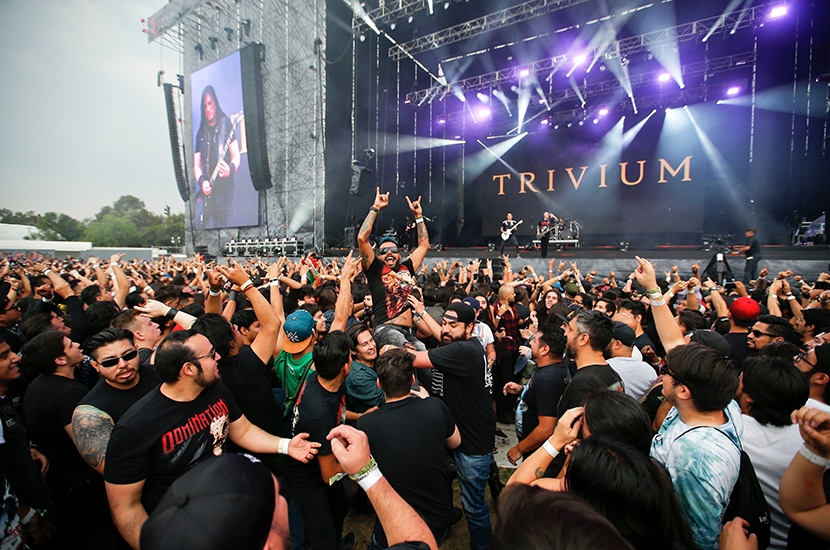There was only so long anyone could put up with the live musical performances of the early days of lockdown: musicians in their living rooms, performing stripped-back versions of their songs in broadcasts that froze or stuttered. The time would come, inevitably, when everyone wanted more. Viewers would want something more closely approximating a full show; musicians would want to be paid.
Laura Marling was early through the gates: last month, she promoted her latest album with two concerts at the Union Chapel in London, played to an empty hall but streamed for UK and US audiences. There was a certain excitement about it all: here was a way for musicians to make the money they had been missing — around 4,000 people paid £12 a head to watch Marling — and for fans to experience live music in safety, comfort and with much better sightlines than they ever get in real gigs. Excited commentators wondered: is this the future of live music?
Excited commentators wondered: is this the future of live music? Here’s your answer: no
Here’s your answer: no.
There are practical reasons for that. You can’t tour a livestream, for one thing. You can’t do 50 livestream dates, because everyone who wants to see the show can see it first time round, and Marling can play to 4,000 people in London anyway, so an entire audience of 4,000 streams isn’t all that encouraging. If this really were the future for musicians, they’d have relied for years on live DVDs to generate revenue, instead of going on the road. And the reason more people will go to actual shows than watch a stream of one is that live music is an experience that’s about rather more than the perfect playing of notes and chords.
That’s especially true of metal, a genre whose impact is heightened live: the volume that thwumps the sternum; the fierce community of the moshpit; the spectacle of big shows with pyrotechnics detonating all over the place. So kudos to the Florida metal band Trivium for what they claimed was a ‘historic’ gig from an empty room at Full Sail University, Florida. You are perhaps not familiar with them, because press and radio routinely ignore metal — they’re kind of top of the second tier of metal; big, but not big enough to be a name familiar to non-metalheads. They streamed the gig around the world via their website; full band, full stage production, multiple camera angles, the whole kit and caboodle.
I’m not sure how truly historic it was, because gigs were livestreamed before lockdown, but they certainly made an effort. On their Facebook page, they offered a live set from a support group, with a host to let everyone know what was happening. There was a chatroom for fans to discuss the set, or just shout ‘AWESOME!’ at each other. As to the performance itself, no expense had been spared. Loud guitar music routinely sounds terrible on television — a poorly mixed mush, lacking the force you get in the flesh, and without clarity. That wasn’t the case here: Trivium sounded sparkling. It was gladdening, too, that they are one of the metal bands who employ ‘clean singing’ — that is to say actual singing rather than someone grunting in a way that, when written, replicates the exclamations of Billy Bunter: ‘Arrrgh! YAROO!’
But what was missing was all the things that make a gig a gig, notably atmosphere. When something went wrong with the drums before ‘Rain’, singer-guitarist Matt Heafy observed that normally he would fill in the gap by joking with the audience, but with no audience to joke with, he was reduced to mumbling along to fill the dead air. With no roiling moshpit, this kind of music — intensely technical, never sticking with one time signature when seven will do — becomes a bit arid. Still, watching Heafy and his fellow guitarist Corey Beaulieu play harmonised lead-guitar lines brought to mind one of the unlikeliest strains of musical influence. Those heavy bands with two guitarists playing in that way all spring from long-forgotten British prog journeymen Wishbone Ash, who were first copied by Judas Priest, Thin Lizzy and Iron Maiden, and then by every metal band with two lead guitarists. That might not have been the takeaway Trivium were hoping for. Still, 10,000 people paid nine bucks each, so the band got what they needed from the experience.
But the homemade, low-budget shows continue, and the best of them can be fantastic. Throughout this Covid moment, Neil Young has been offering up Fireside Sessions, half-hour trots through selections of his back catalogue, now so vast that simple maths suggests any half-hour of Young is likely to include something fantastic. The most recent session (‘Porch Episode’), broadcast at the start of July, but still available at the Neil Young Archives site, was a dazzling run-through of some of his political songs — ‘Alabama’, ‘Ohio’ and ‘Southern Man’ among them — alongside a Dylan cover. It didn’t feel much like someone trying to promote their latest release; it felt like a great artist shining a light on to his past. Recommended. And you don’t have to pay.






Comments